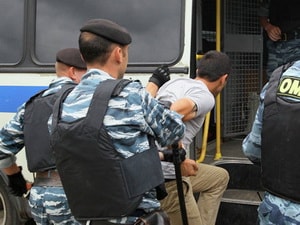Russian President issues new law on immigration
On December 30, President of the Russian Federation Vladimir Putin signed a series of laws that will take effect from January 1, 2014.
It is noteworthy that the law limits the duration of stay of foreigners on the territory of Russia. Accordingly, foreigners
 |
| Police conduct a raid on illegal workers at garment factories in Moscow. (Source: Ria Novosti) |
Until now, foreign citizens entering Russia visa-free could stay for 90 consecutive days, then exit and re-enter with the right to stay for another 90 days.
The Russian Federal Migration Service said the law aims to regulate the migration of foreigners and stateless people, curbing illegal migration that currently brings 3.5 million people to work illegally in Russia.
According to experts, the new law on immigration will affect nearly 1.3 million foreigners in Russia.
Also to implement the 2014 goals and tasks outlined in the annual Federal Message, on the same day, President Putin signed into law a package of laws to protect pensioners. The new cumulative pension system will begin a pilot implementation in 2014 and be fully implemented from 2015.
Under the new law, employees have the right to divide the accumulation rate in their total social fund contributions: either reduce the accumulation rate (down to 0%), at which time the insurance salary rate will increase, or keep the accumulation pension contribution rate at 6%, and the insurance pension rate will decrease accordingly.
In addition, President Putin also signed a law to protect the rights of victims in criminal cases, specifically strengthening measures to protect minors. This law imposes criminal liability for the act of publicly disseminating information about the identity of a minor victim (under 16 years old), as well as the nature of the acts of abuse against the victim./.
According to VNA
